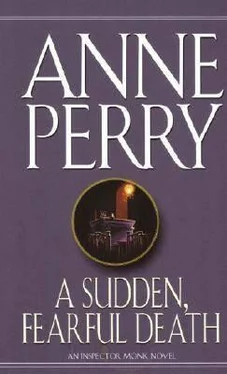"What I do now is what I have always done," Monk said between his teeth, his voice choking. "Tidy up the cases you can't manage and clean up behind you!" He thrust the letters out and slammed them on the desk. "I'm not the only one who knows about them, so don't think you can hide them and blame some other poor sod who is as innocent as that poor bloody footman you hanged." And with that he turned on his heel and walked out, leaving Runcorn white-faced, his hands shaking.
Sir Herbert Stanhope was arrested and charged, and Oliver Rathbone was retained to conduct his defense. He was one of the most brilliant lawyers in London and, since Monk's first case after his accident, well acquainted with both Monk and Hester Latterly. To say it was a friendship would be both to understate it and to overstate it. With Monk it was a difficult relationship. Their mutual respect was high; indeed, it amounted to admiration. They also felt a complete trust not only in the competence but each in the professional integrity of the other.
However, on a personal level matters were different. Monk found Rathbone more than a little arrogant and complacent, and he had mannerisms which irritated Monk at times almost beyond bearing. Rathbone, on the other hand, found Monk also arrogant, abrasive, willful, and inappropriately ruthless.
With Hester it was quite different. Rathbone had a regard for her which had grown deeper and more intimate with time. He did not consider her totally suitable as a lifetime companion. She was too opinionated, had very little idea of what it was suitable for a lady to interest herself in-to wit, criminal cases. And yet, curiously, he enjoyed her company more than that of any other woman, and he found himself caring surprisingly deeply what she thought and felt for him. His mind turned to her more often than he could satisfactorily explain to himself. It was disconcerting, but not entirely unpleasant.
And what she thought and felt for him were emotions she had no intention of allowing him to know. At times he disturbed her profoundly-for example, when he had kissed her so suddenly and gently over a year ago. And there had been a sweetness in their time spent at Primrose Hill with his father, Henry Rathbone, whom Hester liked enormously. She would always remember the closeness she had felt walking in the garden in the evening, and the scents of summer in the wind, cut grass and honeysuckle, the leaves of the apple orchard beyond the hedge, dark against the stars.
And yet at the back of her mind mere was always Monk. Monk's face intruded into her thoughts; his voice, and its words, spoke in the silence.
Rathbone was not in the least surprised to receive the call from Sir Herbert Stanhope's solicitors. Such a man would naturally seek the best defense available, and there were many who would aver without question that that was Oliver Rathbone.
He read all the papers and considered the matter with care. The case against Sir Herbert was strong, but far from conclusive. He had had the opportunity, along with at least a score of other people. He had had the means, as did anyone with sufficient strength in his or her hands-and with a group of women like the average nurses, that included almost everyone. The only evidence of motive was the letters written by Prudence Barrymore to her sister-but they were a powerful indictment, uncontested.
Reasonable doubt would be sufficient to gain an acquittal in law and avoid the hangman's noose. But to save Sir Herbert's reputation and honor there must be no doubt at all. That meant he must provide another suspect for the public to blame. They were the ultimate jury.
But first he must seek an acquittal before the court. He read the letters again. They required an explanation, a different interpretation that was both innocent and believable. For that he would have to see Sir Herbert himself.
It was another hot day, sultry with an overcast sky. He disliked visiting the prison at any time, but in the close, oppressive heat it was more unpleasant than usual. The odors were of clogged drains, closed rooms containing exhausted bodies, fear ebbing slowly to despair. He could smell the stone as the doors closed behind him with a hard, heavy clang and the warder led him to the room where he would be permitted to interview Sir Herbert Stanhope.
It was bare gray stone with only a simple wooden table in the center and a chair on either side. One high window, barred and with an iron grille, let in the light high above the eye level of even the tallest man. The warder looked at Rathbone.
"Call when you want out, sir." And without adding anything further he turned and left Rathbone alone with Sir Herbert. In spite of the fact that they were both prominent men, they had not met before, and they regarded each other with interest. For Sir Herbert it might well prove to be a matter of his life or death. Oliver Rathbone's skill was the only shield between him and the noose. Sir Herbert's eyes narrowed and he concentrated intensely, weighing the_face he saw with its broad forehead, curious very dark eyes for a man otherwise fair, long sensitive nose and beautiful mouth.
Rathbone also regarded Sir Herbert carefully. He was bound to defend this man, a famous public figure, at least in the medical world. The center of the case upon which would rest a good many reputations-his own included, if he did not conduct himself well. It was a terrible responsibility to have a man's life in one's hands-not as it was for Sir Herbert, where it lay on the dexterity of the fingers, but simply upon one's judgment of other human beings, the knowledge of the law, and the quickness of your wits and your tongue.
Was he innocent? Or guilty?
"Good afternoon, Mr. Rathbone," Sir Herbert said at last, inclining his head but not offering his hand. He was dressed in his own clothes. He had not yet stood trial, and therefore was legally innocent. He must still be treated with respect, even by jailers.
"How do you do, Sir Herbert," Rathbone replied, walking to the farther chair. "Please sit down. Time is precious, so I will not waste it with pleasantries we may both take for granted."
Sir Herbert smiled bleakly and obeyed. "This is hardly a social occasion," he agreed. "I assume you have acquainted yourself with the facts of the case as the prosecution is presenting it?"
"Naturally." He sat on the hard chair, leaning a little across the table. "They have a good case, but not impeccable. It will not be difficult to raise a reasonable doubt. But I wish to do more than that or your reputation will not be preserved."
"Of course." A look of dry, harsh amusement crossed Sir Herbert's broad face. Rathbone was impressed that he was disposed to fight rather than to sink into self-pity, as a lesser man might have. He was certainly not handsome, nor was he a man to whom charm came easily, but he quite obviously had a high intelligence and the willpower and strength of nerve which had taken him to the forefront of a most demanding profession. He was used to having other men's lives in his hands, to making instant decisions which weighed life and death, and he flinched from neither. Rathbone was obliged to respect him, an emotion he did not always feel toward his clients.
"Your solicitor has already informed me that you have absolutely denied killing Prudence Barrymore," he continued. "May I assume that you would give me the same assurance? Remember, I am bound to offer you the best defense I can, regardless of the circumstances, but to lie to me would be most foolish because it will impair my ability. I need to be in possession of all the facts or I cannot defend you against the prosecutor's interpretation of them." He watched closely as Sir Herbert looked at him steadily, but he saw no flicker in his face, no nervous movement, and he heard no wavering in his voice.
Читать дальше












